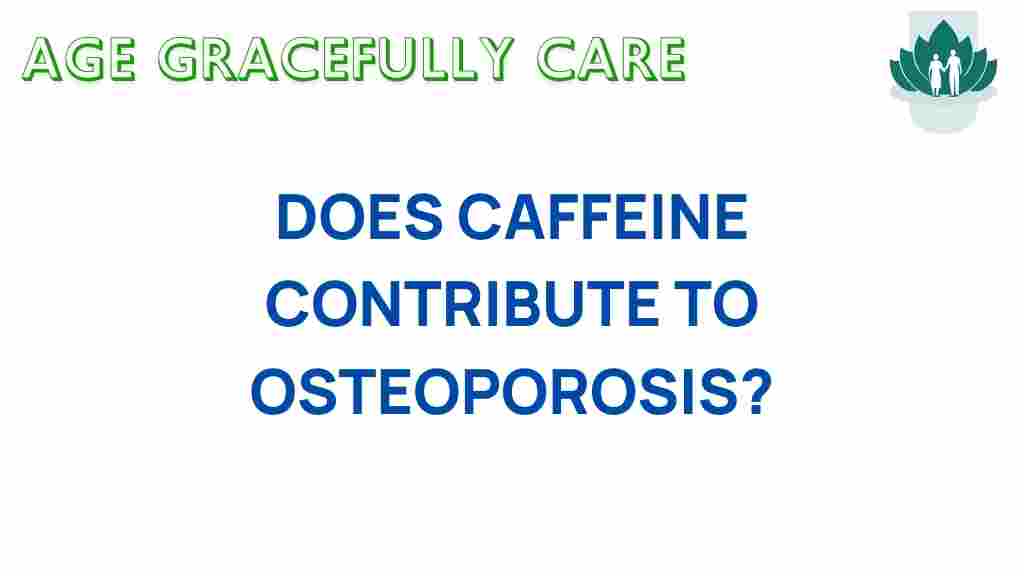Unraveling Caffeine’s Hidden Impact on Osteoporosis Risk
Caffeine is one of the most widely consumed substances in the world, found in coffee, tea, energy drinks, and even certain foods. While many people rely on caffeine for its stimulating effects, its implications for bone health and osteoporosis risk are often overlooked. This article aims to explore the relationship between caffeine, osteoporosis, and overall wellness, shedding light on how dietary choices can influence bone health and the associated risk factors.
Understanding Osteoporosis and Bone Health
Osteoporosis is a condition characterized by weakened bones, increasing the risk of fractures and breaks. It often develops silently, with many individuals unaware of their bone density loss until a fracture occurs. Key aspects of bone health include:
- Bone Density: The amount of bone mineral in bone tissue, which decreases with age and certain lifestyle choices.
- Calcium and Vitamin D: Essential nutrients for maintaining bone strength and density.
- Hormonal Factors: Hormones like estrogen and testosterone play a critical role in bone health, particularly in post-menopausal women.
The Role of Caffeine in Bone Health
Research suggests that caffeine may have a complex relationship with bone health. While moderate consumption is generally considered safe for most individuals, excessive caffeine intake could have negative health implications:
- Calcium Absorption: Caffeine can interfere with calcium absorption in the body, leading to potential deficiencies that could weaken bones.
- Increased Excretion: High caffeine consumption may increase calcium excretion through urine, further reducing calcium levels in the body.
- Bone Density Impact: Some studies indicate that excessive caffeine intake is associated with lower bone mineral density, particularly in older adults.
Risk Factors for Osteoporosis
Osteoporosis risk factors are multifaceted and can be categorized into modifiable and non-modifiable factors. Understanding these is crucial for effective prevention:
Non-Modifiable Risk Factors
- Age: The risk of osteoporosis increases as people age.
- Gender: Women are at a higher risk, especially post-menopause.
- Family History: A family history of osteoporosis can increase individual risk.
Modifiable Risk Factors
- Dietary Choices: Diets low in calcium and vitamin D can contribute to bone health deterioration.
- Physical Activity: Lack of weight-bearing exercise can weaken bones.
- Caffeine and Alcohol Consumption: High intake of caffeine and alcohol can negatively impact bone health.
Caffeine’s Impact on Dietary Choices and Bone Health
Making informed dietary choices is essential for maintaining bone health. Here are some strategies to consider regarding caffeine consumption:
Moderation is Key
Moderate caffeine consumption, typically defined as 3-4 cups of coffee per day, is unlikely to pose significant risks for most people. However, individuals with existing risk factors for osteoporosis may want to limit their intake. Consider the following:
- Evaluate Your Daily Intake: Keep track of your daily caffeine consumption from all sources.
- Replace with Alternatives: Opt for herbal teas or caffeine-free alternatives if you find yourself consuming excessive caffeine.
Enhance Calcium Intake
If you consume caffeine regularly, ensure that you are also getting adequate calcium in your diet. Good sources of calcium include:
- Dairy Products (milk, cheese, yogurt)
- Leafy Greens (kale, broccoli)
- Fortified Foods (orange juice, cereals)
Factors to Consider for Optimal Bone Health
In addition to managing caffeine intake, consider these lifestyle factors to support optimal bone health:
- Regular Exercise: Engage in weight-bearing exercises like walking, jogging, or weightlifting to strengthen bones.
- Sunlight Exposure: Vitamin D is crucial for calcium absorption; aim for safe sun exposure or consider supplements.
- Avoid Smoking: Smoking is a significant risk factor for osteoporosis and should be avoided.
Health Implications of Caffeine on Osteoporosis
The health implications of caffeine consumption extend beyond bone health. Here are some broader considerations:
- Cardiovascular Health: High caffeine intake may increase heart rate and blood pressure in some individuals.
- Anxiety and Sleep Disturbance: Excessive caffeine can lead to increased anxiety and disrupted sleep patterns.
- Long-term Bone Health: Understanding the cumulative impact of dietary choices, including caffeine, can inform long-term health strategies.
Step-by-Step Guide: Evaluating Your Caffeine Intake
To better understand your caffeine intake and its implications for osteoporosis risk, follow this simple guide:
Step 1: Track Your Consumption
For one week, keep a log of all sources of caffeine you consume, including:
- Coffee
- Tea
- Energy drinks
- Chocolate
Step 2: Assess Your Calcium Intake
Review your diet for sources of calcium and vitamin D. Ensure you are meeting your daily recommended intake:
- Adults typically need around 1000 mg of calcium per day.
- Vitamin D needs vary; aim for 600-800 IU daily, depending on age and health status.
Step 3: Make Adjustments
Based on your assessment, consider making adjustments:
- If your caffeine intake is high, consider reducing it gradually.
- Enhance your diet with calcium-rich foods or supplements as needed.
Troubleshooting Tips for Managing Caffeine Intake
If you’re struggling to manage your caffeine intake or its impact on bone health, consider these troubleshooting tips:
- Identify Triggers: Recognize situations that prompt excessive caffeine consumption, such as stress or fatigue.
- Find Alternatives: Experiment with caffeine-free beverages that you enjoy, like herbal teas or decaf coffee.
- Stay Hydrated: Drink plenty of water to help reduce cravings for caffeinated drinks.
Conclusion
Caffeine’s hidden impact on osteoporosis risk is an important consideration for anyone concerned about their bone health. While moderate consumption is generally safe, excessive intake may pose risks, particularly for those with other risk factors for osteoporosis. By understanding the relationship between caffeine, dietary choices, and lifestyle factors, individuals can make informed decisions to support their bone health and overall wellness.
For further information on osteoporosis and dietary choices, check out this comprehensive guide. Remember, prioritizing nutrition and making conscious lifestyle choices can significantly impact your long-term health.
By addressing caffeine consumption and its implications, you can take proactive steps towards maintaining your bone health and reducing your osteoporosis risk.
This article is in the category Health and created by AgeGracefullyCare Team
